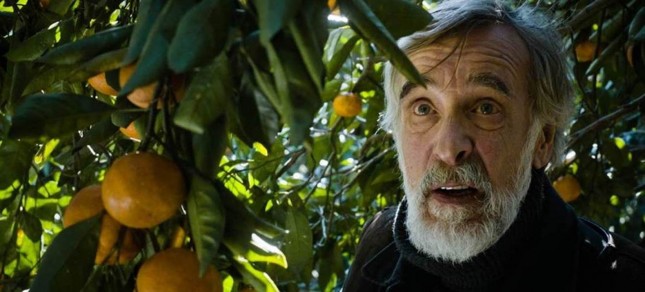
Dir.: Zaza Urushadze
Cast: Lembit Ulfsak, Elmo Nugamen, Giorgi Nakashidze, Misha Meshki
Estonia/Georgia 2013, 87 min.
Writer/director Zaza Urushadze (Here comes the Dawn) has succeeded where many before him failed: TANGERINES is an authentic anti-war film that neither glorifes nor moralises over the murderous pursuit without offering any real alternatives.
TANGERINES is set in a rural village in Abkhazia (Georgia) during the 1992/3 conflict, when the Russian-backed forces from North Caucasia tried to invade Georgia. Ethnic Estonians fled to the region and settled long ago, but most of them had returned to their homeland, recently liberated from the Soviet regime when the war broke out in Georgia. Just two old men, Ivo (Ulfsak) and Margus (Nuganen), have stayed in the village where Margus farms tangerines, Ivo making the wooden boxes to package the fruit for market. One day, the fighting reaches their village and just two men survive: Ahmed (Nakashidze), a Chechen mercenary fighting for the rebels; and Niko (Meshki), a Georgian. Ivo offers them refuge in his house but spends most of his time keeping them apart as their animosity towards each other is not quelled by their serious injuries. But time is a great healer and as Urushadze’s slow-burning narrative unfolds a remarkable relationship develops between the pair proving that the human bond is often stronger than national identity or even religion.
Using the conflict as a mere counterpoint to his human story, Urushadze takes his time in introducing his characters authentically, showing the two Estonians at work and concentrating on the victims of war, rather than the exponents. Ahmed and Nico’s friendship is tentatively sketched through careful gestures as they gradually build a trusting bond. The camera is a brilliant observer, showing objects and faces in long panning shots. The beauty of nature is in stark contrast to human devastation: the tangerines are destroyed in the mayhem and become symbolic of the damage humans wreak through war, both to each other and the environment. Melancholia is the dominant mood: Ivo has a photo of his granddaughter on his wall, claiming that she is the most important person in his life, but he is evasive when asked why he has not emigrated to Estonia to join her. The reason why gradually emerges, providing subtle dramatic tension; and like everything else in TANGERINES, explanations come too late. A wonderful and humanistic film, showing the depth and breadth of human emotions from both ends of the scale. Through his quietly intense study of the human cost of war, Urashadze shows how there is always a choice. AS|MT.
NOW ON DVD/blu-ray